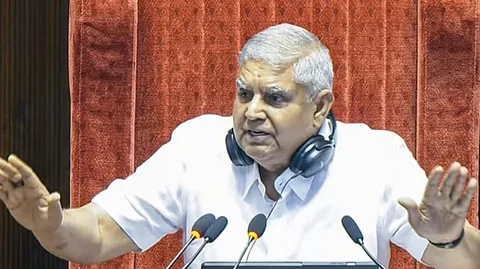

A dramatic sequence of events has gripped the political capital as Vice President Jagdeep Dhankhar’s surprise resignation came just hours after tensions flared between the Rajya Sabha Chairman and the government over an Opposition-backed impeachment notice against a sitting judge of the Delhi High Court.
The controversy erupted after Dhankhar acknowledged in the Upper House a motion signed by 63 Opposition MPs seeking the impeachment of Justice Yashwant Varma, who is facing allegations of corruption following a cash seizure at his Delhi residence earlier this year.
The move reportedly caught the government off guard. Sources revealed that two senior central ministers — Union Health Minister and Leader of the Rajya Sabha JP Nadda and Parliamentary Affairs Minister Kiren Rijiju — reached out to Dhankhar, suggesting that Prime Minister Narendra Modi was unhappy with the development. Rijiju reportedly told Dhankhar that such matters are usually taken up in the Lok Sabha through consensus, pointing out that Opposition leader Rahul Gandhi had signed the motion.
However, Dhankhar is said to have stood firm, asserting that he was well within his constitutional powers as the Chairman of the Rajya Sabha to accept the notice.
The fallout was swift. The government, reportedly furious, boycotted the second Business Advisory Committee (BAC) meeting on Monday evening. Just hours later, Dhankhar submitted his resignation to President Droupadi Murmu, citing health concerns.
“In view of medical advice and to prioritise health care, I hereby resign as Vice President of India, effective immediately,” he wrote in his resignation letter, invoking Article 67(a) of the Constitution. The Union Home Ministry formalised the decision late Monday night via a gazette notification.
The resignation came on the same day as a cryptic social media post from the Vice President’s official handle at 9:25 PM. Prime Minister Modi’s response — a terse message posted nearly 15 hours later — did little to quell speculation about the real reason behind the abrupt departure.
Meanwhile, the Election Commission of India has begun the process of preparing for the Vice Presidential election. It is in the process of constituting the electoral college comprising all elected and nominated MPs from both Houses, and will soon announce the schedule.
The NDA currently holds a clear edge in the 782-member electoral college, with 426 members compared to 312 from the INDIA bloc. According to Article 68(2) of the Constitution, the vacancy must be filled “as soon as possible,” and the person elected will serve a full five-year term from the date they assume office.
The political storm surrounding the impeachment motion has left Parliament rattled. Government sources say the Centre is still keen on initiating the impeachment through the Lok Sabha route and may push for the appointment of a judicial committee to investigate the charges against Justice Varma.
Adding to the intrigue, sources told Hindustan Times that Dhankhar himself had urged Opposition MPs to submit the motion in the Rajya Sabha, even as the government was finalising plans to move it in the Lok Sabha.
On Monday morning, Dhankhar announced in the House:
“I have received a notice of motion under Article 217(1)(B) read with Article 218 and Article 124… to constitute a statutory committee for the removal of Justice Yashwant Varma. This is signed by more than 50 members of the Council of States.”
Notably, no MP from the ruling NDA had signed the notice — a clear indication of the lack of coordination between the government and the Chair.
Later that day, senior BJP leaders including Amit Shah, JP Nadda, and Kiren Rijiju held back-to-back meetings with Lok Sabha Speaker Om Birla and Rajya Sabha Deputy Chairman Harivansh, with impeachment matters reportedly dominating the discussions.
With Dhankhar’s resignation now official, the INDIA bloc has begun internal deliberations on its strategy for the upcoming Vice Presidential election. Congress president Mallikarjun Kharge confirmed that all alliance partners will meet soon to decide on a common candidate.
As the nation awaits the announcement of election dates, Dhankhar’s exit has not only left a leadership vacuum but also exposed widening rifts over constitutional procedures and the politics surrounding judicial accountability.
(This story is published from a syndicated feed)